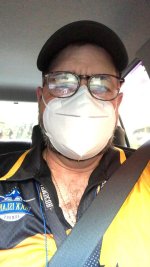Guys, this isn't absolutely one or the other. Saying "masks protect X, but not Z" is too simplistic.
Obviously, if you're knowingly or unknowingly infected, any mask will limit the range to which your exhaling, coughing, or sneezing will launch any virus. It primarily protects others from you.
If you're not infected, a mask still gives a degree of protection depending on your location. The virus appears not to stay airborne very long and is quickly dispersed by moving air outdoors, but if you're in closed rooms with other people, a face mask can certainly reduce the possibility of inhaling some. Remember that the virus isn't a self-propelled missile that's set to "penetrate" your mask.
So the prudent thing would be to wear it in those scenarios where you're close to unknown and potentially infected people and quick dispersal isn't likely. Unfortunately, for health care folks that's 100% of the time; but as a "civilian", just exercise good judgment, especially since you can't know for sure whether you might be infected without symptoms.






